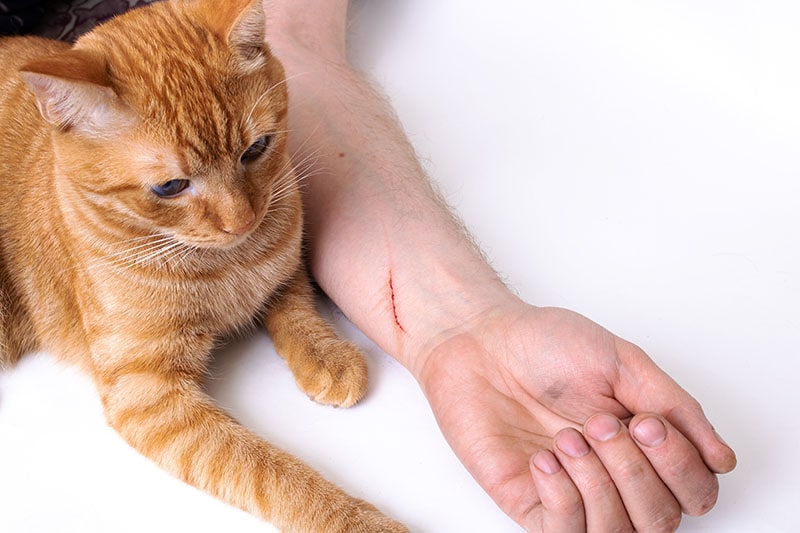
Rabies is a dangerous disease that often leads to death. Unfortunately, all unvaccinated cats are susceptible to the disease if they spend any amount of time outdoors. Even if your cat is kept strictly indoors, there is always a chance that they will escape. All it takes is one physical interaction with an infected animal such as a bat, a raccoon, a skunk, or a fox to contract rabies.
So, whether you come across a stray cat outdoors or your kitty gets rabies during an escapade outside, it is important to know if you can get rabies from a cat scratch. The short answer is that yes, it is possible to contract rabies from a cat scratch. But don’t panic! There is more to the story, so read on.
 Cat Scratches Can Result in Rabies But It’s Rare
Cat Scratches Can Result in Rabies But It’s Rare
According to the CDC, it is possible to get rabies from a cat scratch, but it is rare. Rabies is typically transmitted through saliva. It’s when an infected cat’s saliva makes contact with an open wound or your eyes, nose, or mouth that the chance of contracting rabies is highest. Even then, you can get a vaccine to minimize the risk of getting ill. If an infected cat scratches you but their saliva does not make contact with you, chances are that you have nothing to worry about. Even so, it is essential to see a doctor immediately if a rabid cat scratches you.

What to Do If You’re Scratched by a Cat That May Be Infected With Rabies
To be on the safe side, it is a good idea to always treat strange cats that you come across outdoors as if they have rabies. With this in mind, you should stay calm but contact a doctor as soon as possible after being scratched by a strange cat. This is especially important if the strange cat is acting aggressive, drooling, or comatose. You likely won’t contract rabies, but your doctor may want to vaccinate you just in case.
If an indoor cat that has recently gotten outdoors scratches you, isolate the feline for a few days to see if they develop any signs of illness. If so, you should see a doctor to determine whether you need treatment. If you are scratched by a house cat that you know and that has not been exposed to the outdoors, there is no need to do anything but treat your scratches as necessary.
Can Other Diseases Be Contracted When a Cat Scratch Occurs?
Unfortunately, rabies is not the only thing to worry about if you get scratched by a cat, especially one that you don’t know or who spends most of their time outdoors. There is no need to immediately rush to a doctor, but you should keep an eye out for symptoms that could indicate disease. Here are the diseases to be aware of:
How to Keep Your Cat Safe From Rabies and Other Diseases
The most important thing that you can do to keep your cat safe from rabies and other diseases is to keep up with their vaccination schedule. Making sure your cat’s vaccines are up to date will provide your cat with the best protection possible against diseases of many kinds. It is also important to consider keeping your cat indoors. Anytime they go outside, there is a chance that they will come into contact with an infected wild animal and become infected themselves.
If you don’t want to keep your cat strictly indoors, consider building a catio for them to spend time in during the day. This will help ensure that they don’t make physical contact with unknown animals outside. If your cat does get outside and become unwell, isolate them away from other pets indoors for about a week to see if they develop signs of disease. If nothing happens, reintroduce them to the general household. Otherwise, schedule an appointment with the vet, and keep your feline isolated until the appointment time arrives.

 A Final Recap
A Final Recap
There is no doubt that cats can get rabies and pass it on to humans. However, the risk of contracting rabies through a cat scratch is low. Still, it is important to know the signs of rabies and, most importantly, to keep yourself and your cat protected from the risk of contracting the disease. Also, rabies is not the only disease to worry about, which is why you should never interact with a stray cat, especially if they look ill.
Featured Image Credit: AJR_photo, Shutterstock

 Cat Scratches Can Result in Rabies But It’s Rare
Cat Scratches Can Result in Rabies But It’s Rare




